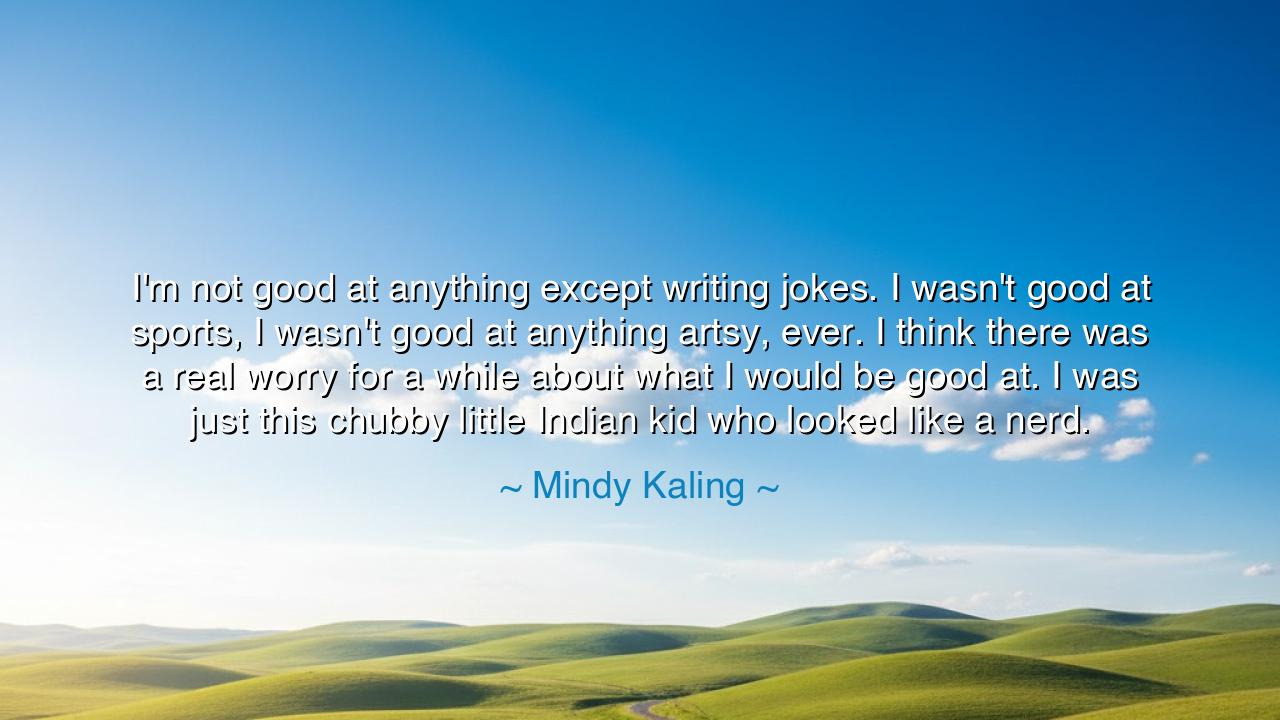
I'm not good at anything except writing jokes. I wasn't good at
I'm not good at anything except writing jokes. I wasn't good at sports, I wasn't good at anything artsy, ever. I think there was a real worry for a while about what I would be good at. I was just this chubby little Indian kid who looked like a nerd.






The words of Mindy Kaling, “I’m not good at anything except writing jokes. I wasn’t good at sports, I wasn’t good at anything artsy, ever. I think there was a real worry for a while about what I would be good at. I was just this chubby little Indian kid who looked like a nerd,” carry with them the vulnerability of youth and the triumph of discovering one’s true gift. In them, we hear the voice of one who did not fit easily into the molds the world offered—neither the hero of the playing field nor the shining star of traditional artistry—but who nevertheless found a weapon sharper than any sword: humor.
The origin of this thought lies in Kaling’s own journey of self-discovery. As a child, she was surrounded by expectations: to excel in academics, to succeed in sports, to display talent in areas the world quickly recognizes. Yet she felt herself outside of those measures, overlooked, even pitied. What seemed like failure, however, was simply the world’s inability to see the seed of genius growing within her. For in the shadows of doubt, she cultivated laughter—the ability to write jokes that pierced through awkwardness and connected her to others. What began as a survival skill blossomed into a vocation.
History too reveals such stories. Consider Winston Churchill, who in his youth was mocked for poor performance in school and clumsiness in sport. Teachers doubted him, peers dismissed him. Yet he possessed the gift of words, and in time, his speeches would rally nations against despair. Like Kaling, his strength was not in the obvious places, but in the hidden talent that at first seemed too small to matter. Their lives remind us that greatness often grows in unexpected soil.
Kaling’s words also remind us of the loneliness of difference. To be called a nerd, to feel one’s body or interests do not align with the world’s ideals, is a wound many carry. Yet what others see as weakness can be transformed into a foundation of strength. Her humor, sharpened in the face of doubt, became both shield and sword. The very qualities that marked her as different in youth became the very traits that fueled her rise as a writer, comedian, and creator.
The lesson is clear: do not measure yourself by the yardstick of the crowd. The world may praise the athlete or the artist, but your strength may lie elsewhere, in a gift the world has not yet learned to honor. If you feel out of place, it may be because your path is not yet visible to others. Like Kaling, you may discover that what once seemed a small, solitary talent is in fact the very thing that will lift you to purpose.
Practically, this means embracing your uniqueness, even when it feels like failure. If you have one skill, nurture it relentlessly. If you feel different, let that difference shape your voice. Do not despair if the world does not recognize your gift immediately, for time will reveal its power. Seek not to fit every mold, but to carve your own shape into the stone of life. What begins as the uncertain laughter of a child may one day become the voice that inspires millions.
So, beloved listener, let Mindy Kaling’s words guide you: it is enough to be good at one thing, if that one thing is truly yours. Do not be crushed by what you lack, but rejoice in what you have. For the chubby child, the overlooked student, the mocked “nerd” may in truth be the vessel of great light, carrying a gift the world desperately needs. And when that gift is embraced, it transforms not only the life of the one who bears it, but also the lives of countless others who will be touched by its brilliance.






AAdministratorAdministrator
Welcome, honored guests. Please leave a comment, we will respond soon